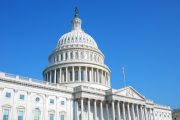
New Hampshire Republicans were on the warpath when they gathered at the Capital Center for the Arts in Concord on September 25 to rally their troops and vent their wrath at the Democrats who, they say, are leading the state and the nation to ruin. Led by former governor John H. Sununu, who was chief of staff to former President George H. W. Bush, candidates John Stephen for governor, Kelly Ayotte for U.S. Senate and Frank Guinta and Charles Bass for the U.S. House, New Hampshire candidates and the roughly 300 delegates to the state GOP convention gave every indication of believing this is going to be a winning year for Republicans.
And since New Hampshire has the first-in-the-nation primary every four years, it was hardly surprising that the keynote speaker was former Massachusetts Governor Mitt Romney, often mentioned as a possible contender for the Republican nod for President in 2012. Romney, from a neighboring state and with a second home in Wolfeboro, New Hampshire, would have a geographical advantage when campaigning in New Hampshire, but the millionaire businessman and former organizer of the Olympic games finished well behind Sen. John McCain of Arizona in the 2008 New Hampshire primary.
Romney, not surprisingly, hailed the GOP ticket in New Hampshire and went out of his way to also pay tribute to the campaign of Manchester attorney and former chairman of the State Board of Education Ovide Lamontagne, who finished a close second behind Ayotte in the race for the party’s U.S. Senate nomination. Lamontagne had been a backer of Romney’s 2008 presidential bid.
The former Bay State governor, whose “Romneycare” health insurance enacted in Massachusetts has sometimes been compared to the national “Obamacare” program, said the President “has declared war on private enterprise in America” and accused the incumbent of using the bad economy as a pretext for advancing a liberal agenda instead of focusing on policies that would lead to job creation. Obama and the Democrats, Romney said, want to “change the way America works.”
Romney was the only prominent national Republican and potential presidential candidate to attend the New Hampshire event, though about a half dozen books by former Speaker of the House Newt Gingrich were offered for sale, including one called, Rediscovering God in America, a slender volume loaded with quotations from the nation’s Founders, as well as Alexis de Tocqueville and others, about the spiritual roots of the America’s war for independence and its way of life before the forces of militant secularism forced religion to the periphery of public thought and discourse. Other potential GOP presidential contenders, including Gov. Tim Pawlenty of Minnesota, Gov. Bobby Jindall of Louisiana, former Arkansas governor and winner of the 2008 Iowa caucuses Mike Huckabee, and former Alaska Governor Sarah Palin, among others, had no presence at the event.
The New Hampshire Republicans, meanwhile, are eager to shove Gov. John Lynch, a three-term Democrat to the periphery of Granite State politics. Lynch, seeking an unprecedented fourth consecutive two-year term as governor, was blasted for his handling of the state’s fiscal crisis, including an attempt to raid the account of the New Hampshire Medical Malpractice Joint Underwriting Association to balance the state budget. The New Hampshire Supreme Court ruled early this year that the transfer of $110 million from the insurance fund to the state’s general fund was illegal and nullified the legislation. Delegates at Saturday’s convention passed a resolution condemning the governor and the Democratic legislators for making that attempt. They also passed a resolution praising the Republican National Committee for recognizing New Hampshire’s claim to the first presidential primary every four years.
Lynch, who has won easy victories in his previous three elections, will have a fight on his hands if recent polling is accurate. The latest Rasmussen poll showed the race between the incumbent and Republican John Stephen, a former commissioner of the state department of Health and Human Services, to be a virtual dead heat, with Lynch holding a slender 48 to 46 percent lead.
The race that has generated the most interest thus far, though, is the U.S. Senate contest in which Ayotte nosed out Lamontagne by a percentage point for the chance to run for the seat being vacated by retiring three-term Senator Judd Gregg. Ayotte, 42, received national attention as the state’s attorney general when she challenged a federal court ruling that the state’s parental notification law on abortion, challenged by Planned Parenthood of Northern New England and the American Civil Liberties Union of New Hampshire, was unconstitutional. Ayotte challenged the ruling all the way to the U.S. Supreme Court, against the expressed wishes of Gov. Lynch, who appointed her. The court ruled that the law was constitutionally flawed and remanded it to a lower court. The case was still pending when the state’s lawmakers repealed the law and Lynch signed the repeal.
In her campaign against U.S. Rep. Paul Hodes, however, Ayotte has focused on economic issues, ridiculing the Democratic congressman’s claim to fiscal conservatism by reminding audiences of his many earmarks. On the abortion issue, Hodes is very much a defender of a women’s “reproductive freedom,” and has vowed that Republicans will restrict it “over my dead body.”
Photo: Republican senate nominee Kelly Ayotte speaks to delegates at the New Hampshire Republican Convention in Concord, N.H., Sept. 25, 2010: AP Images



